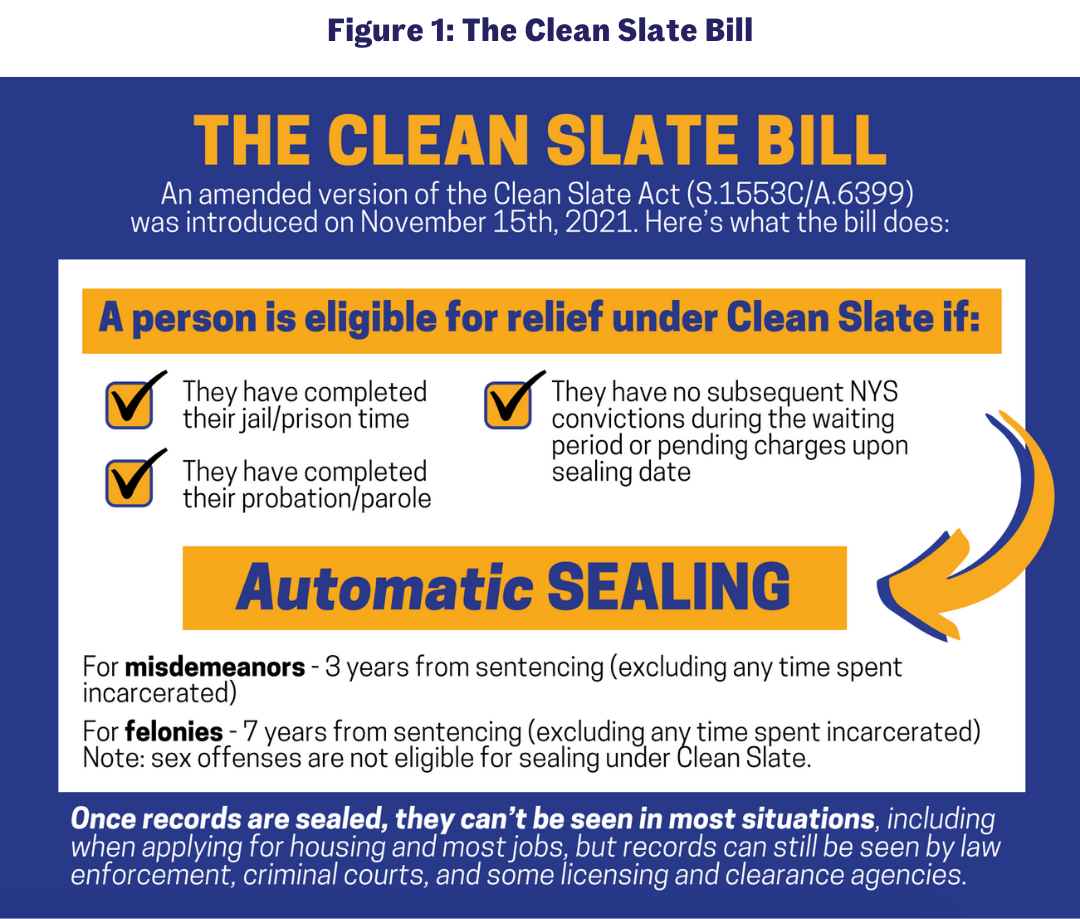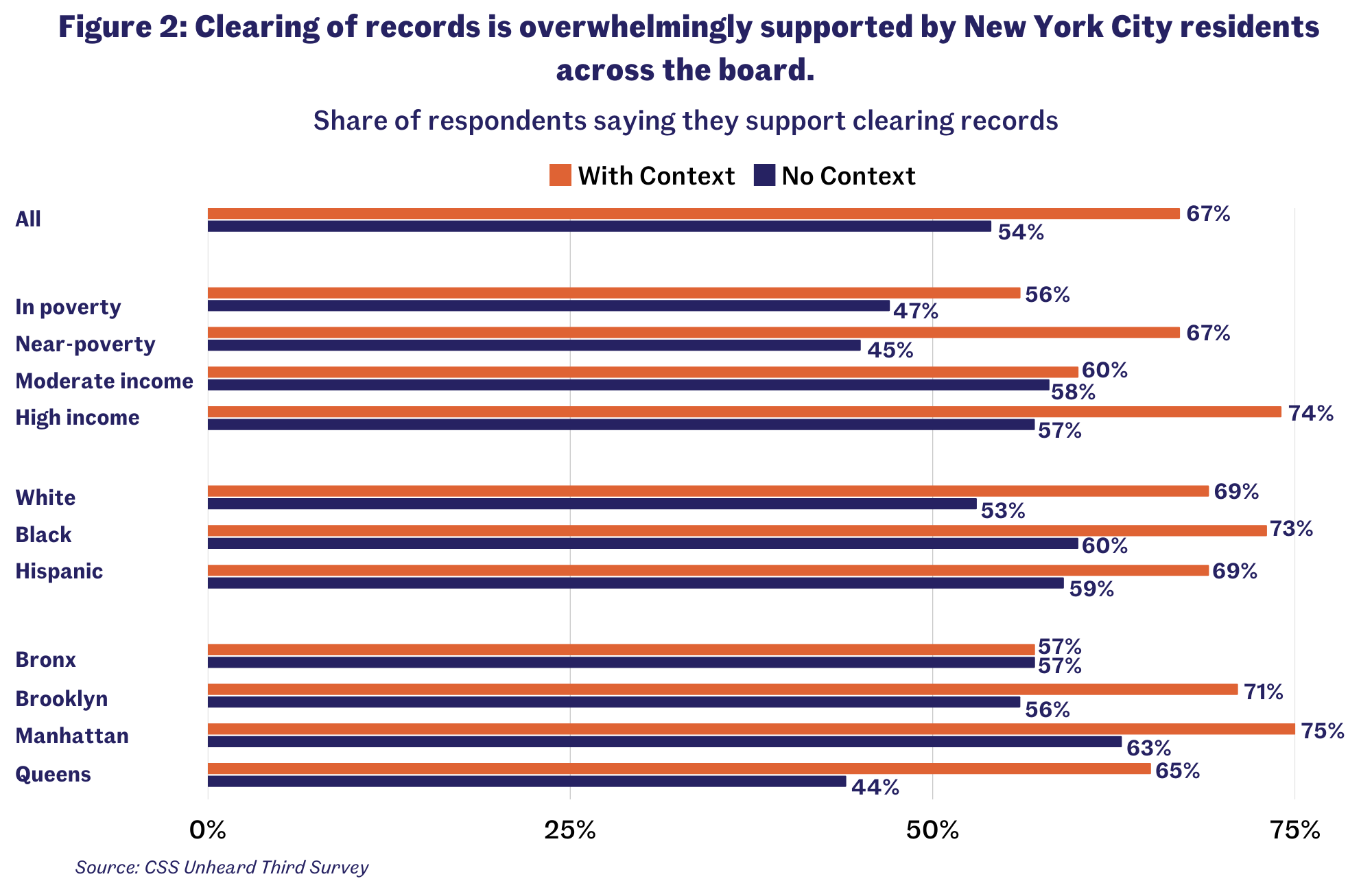Most New Yorkers Favor Clearing Conviction Histories
Debipriya ChatterjeeStephen DunnJudith WhitingEmerita Torres
The Community Service Society’s Unheard Third Survey—the longest running survey of low-income communities in the nation—finds that a majority of New York City residents support clearing conviction histories after seven years, across political affiliations, race, and income.
Introduction
Today, 2.3 million New Yorkers with conviction records, a majority of whom are Black and Latina/o/x, face systemic barriers to employment, housing, education, and other basic life essentials that would allow them to thrive. Despite having served their sentences, they live in a state of perpetual punishment. These barriers tear families apart and perpetuate inequity through intergenerational trauma and economic instability. The civil damage a conviction record can inflict is often wide-ranging and enduring—permanently barring many individuals from basic opportunities like stable jobs, licenses to practice trades, and safe, secure housing.
This immense and long-standing injustice propelled the Community Service Society of New York (CSS) to help launch the Clean Slate NY campaign in 2019. Clean Slate NY advocates for legislation that would automatically clear a New Yorker’s conviction record once they become eligible (see Figure 1 for details). Since 2019, the campaign has grown to include over 150 coalition members, including Fortune 500 companies like Microsoft, Verizon, and JPMorgan Chase, as well as nearly 50 law firms across the state, major unions, survivor advocates, and faith leaders. Political leaders throughout the state and across the political spectrum have called for the passage of Clean Slate, including Governor Kathy Hochul, New York City Mayor Eric Adams, Manhattan District Attorney Alvin Bragg, New York City Public Advocate Jumaane Williams, New York City Comptroller Brad Lander, and City Council Speaker Adrienne Adams. Introduced by Senator Zellnor Myrie and Assemblymember Catalina Cruz, the Clean Slate Act (S1553C/A6399B) has garnered widespread support: local and municipal governments have passed resolutions in support of Clean Slate, including Hudson Common Council, Albany City Council, Buffalo Common Council, the Westchester County Board of Legislators, and most recently the New York City Council.
New York State’s Executive Budget for Fiscal Year 2023, presented earlier this year by Governor Hochul, included a version of Clean Slate. However, there were significant differences between this version and the Clean Slate Act (S1553C/A6399B) that is supported by the coalition and was included in the Senate’s one house budget. Most importantly, the executive version included unworkable waiting periods that would have rendered the promise of Clean Slate meaningless. Budget negotiations were unproductive, and the bill was not included in the final budget. This was disappointing not only because the state missed a vital chance to drastically improve the lives of millions of New Yorkers, but equally so because New Yorkers overwhelmingly support the bill.
Governor Hochul has stated that she remains committed to passing Clean Slate this legislative session. Likewise, Clean Slate champions in both the Senate and Assembly are working diligently to ensure that Clean Slate legislation passes before the close of session in just a few short days.
To gauge New York City residents’ opinions about records clearance, CSS included questions about it in our 2021 Unheard Third Survey. Since we believed that survey respondents would need more information to understand what is meant by records clearance and its potential ameliorative effects, we posed split sample questions—one with context and one without. Two-thirds of all respondents (67 percent) said that they supported clearing conviction records when given the added context that conviction records can prove to be impediments in securing employment and housing. When the question was posed without the additional context, we noticed a decline in support, but a majority—54 percent of respondents—still said that they supported records clearance. Figure 2 shows a detailed breakdown of support for clearing conviction records by income levels, race/ethnicity, borough, and gender.
Unheard Third Survey questions on attitudes towards clearing conviction records:
With Context
As you may know, people with convictions on their records are sometimes not hired for jobs or approved for housing because of their prior convictions. Do you favor or oppose a proposal that would remove criminal convictions from a person’s record 7 years after they have served their sentence? Is that strongly or not so strongly?
No Context
Do you favor or oppose a proposal that would remove criminal convictions from a person’s record 7 years after they have served their sentence? Is that strongly or not so strongly?
Key observations:
1. Sealing is strongly supported by New York City residents across income levels.
Across income groups, a majority of New York City residents favor clearing criminal records as seen in Figure 2. When grouped in income categories as defined by their distance from the federal poverty line (FPL), respondents support records clearance by over 55 percent when presented with context, and by over 45 percent when no context is presented. Almost 75 percent of high-income New Yorkers (incomes above 400 percent of the FPL) support clearing records when provided with additional context—the highest rate among all the categories.
2. Sealing conviction records is strongly supported by New York City residents across all races/ethnicities
White, Black and Latina/o/x New Yorkers are all highly supportive of clearing records: Almost 70 percent of White and Latina/o/x respondents report that they favor the measure. Among Black New Yorkers, the share who support clearing records is 73 percent.
3. Sealing conviction records is strongly supported by New Yorkers across all boroughs
A majority of New Yorkers in every borough support clearing conviction records. Notably, residents of Manhattan and Brooklyn are most in favor with over 70 percent expressing support.
Support for sealing is high among Democrats and Independents; a majority of Republicans also support it.
Among respondents who said they were registered as Democrats and Independents, more than 70 percent support sealing when asked with additional context. Among respondents who were registered as Republicans, a majority—55 percent support sealing.
Conclusion
In New York, a conviction can mean a lifetime of blocked opportunity. More than one in seven people have a conviction record, which keeps many from accessing basic opportunities like employment and housing. Because background checks are used in so many circumstances, many individuals with conviction histories can never move forward with their lives.
Bipartisan support, as well as support across race/ethnicity and income range, is only growing stronger for legislation that would seal conviction records and allow individuals to move forward into economic opportunity and the chance for a better life.
The Clean Slate Act will achieve these goals. By ensuring that New Yorkers are not punished beyond their sentences and can be full and fair participants in economic and civic life, Clean Slate will strengthen communities and our state as a whole.
At a time when our economy needs a serious boost, and support for sealing legislation is at its highest level, Clean Slate truly cannot wait.
About the Unheard Third Survey
The 2021 Unheard Third is a scientific telephone survey of 1,762 New York City adult residents reached by cell phones and landlines from July 8th through August 10th, 2021. It was designed by the Community Service Society in collaboration with Lake Research Partners, who administered it using Random Digit Dialing and professional interviewers. The sample included 1,110 low-income residents (up to 200% of federal poverty standards, or FPL), and 653 moderate and higher-income residents (above 200% FPL). Interviews were conducted in English, Spanish, and Chinese. The margin of error for the entire survey is +/- 2.3 percent, for the low-income component is +/- 2.9 percent, and for the higher income component is +/- 3.8 percent, all at the 95% confidence interval. For further information please reach out to Emerita Torres at etorres@cssny.org.


